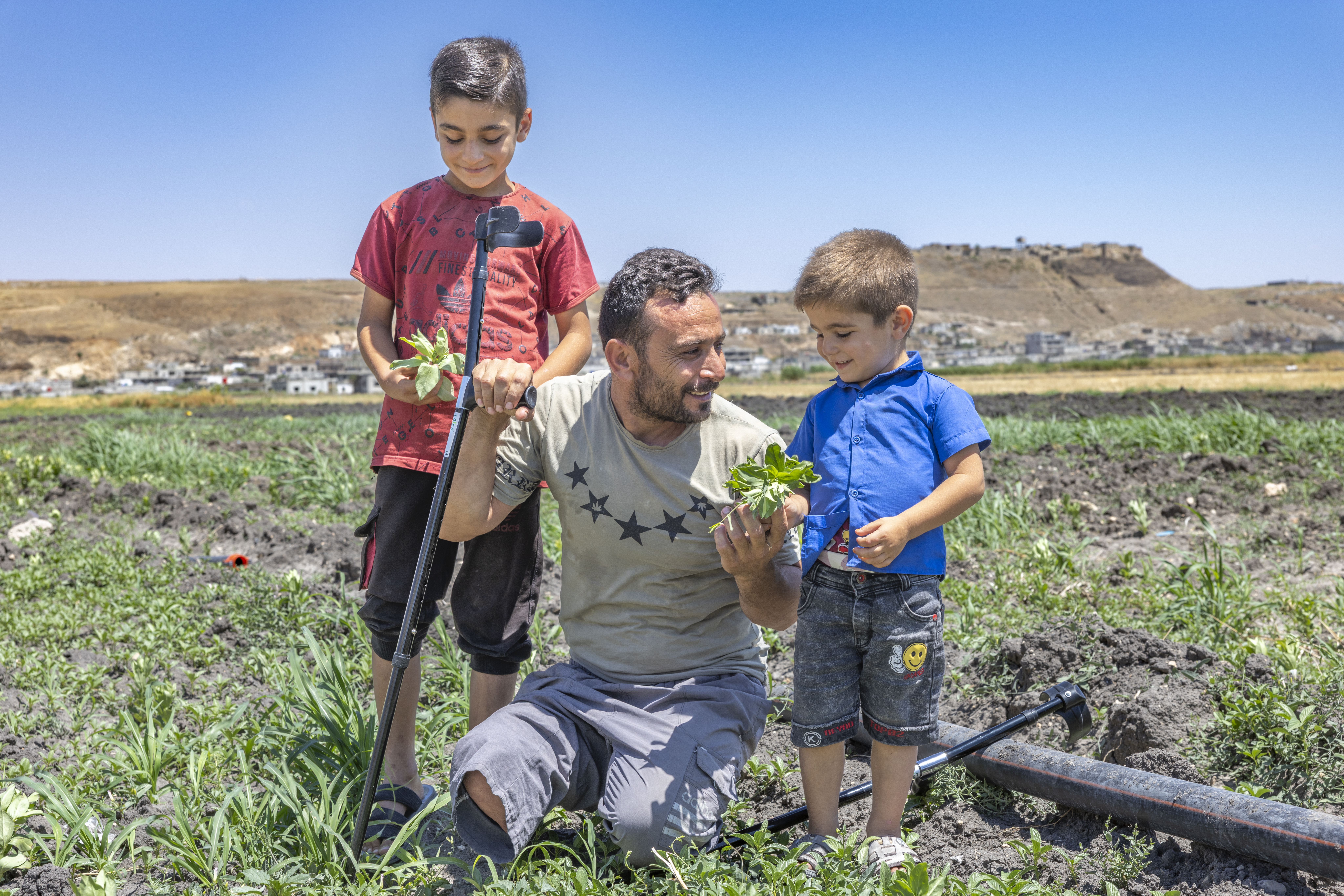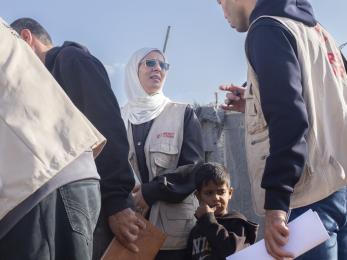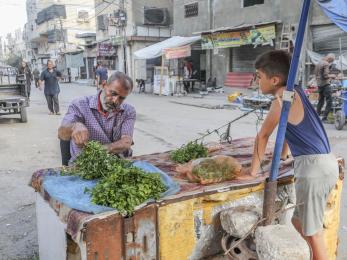Syrian refugees brave brutal summer conditions
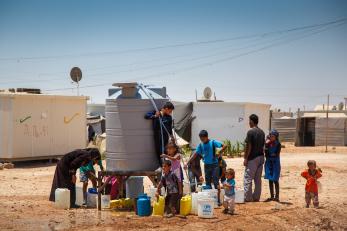
Life in a refugee camp is difficult in every imaginable way. And as the seasons change, so do the challenges Syrian families face in their temporary homes. In Zaatari camp, home to more than 80,000 refugees, the summer living conditions are almost unbearable.
The desert sun beats down on the camp day after day, and refugee families have little to protect them. The “streets” of Zaatari are lined with metal caravans that bake in the heat and act as saunas, stifling anyone inside.
Dust storms are commonplace, too. Neither the metal caravans or thin tents that refugee families live in can keep out the dust and sand.
In these brutal conditions, the need for clean water is dire. Families must have water to use for drinking, cleaning and bathing — but there is never enough in Jordan.
We spoke with refugees at Zaatari about their experience in the camp during the summer heat. Read their stories, learn more about water scarcity in Jordan and find out how you can help.
Nisreen
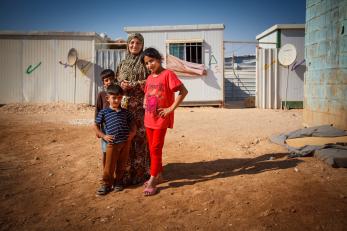
Nisreen, 36, fled to Zaatari from Daraa, Syria in 2012 with her husband and five children.
“It’s hard here because they bring us water every three to four days. The water just arrived, so I’m cleaning the house — this is the day. It’s hard and the dust is always here.
In the summer, living here is a disaster. I’m always tired. The water issue is a problem — the kids shower every four days. They go out and play in the dust and get dirty the same day, it’s not enough water to clean and take care of themselves each day.
Sometimes the kids turn negative and say 'What is this life?! This is not a good life that we don’t have water!' We feel ashamed that we can’t offer the children any more.”
Samah
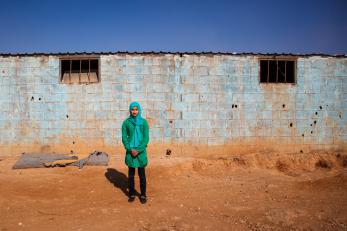
Samah, 15, fled Daraa, Syria in 2012 with her parents — mother, Nisreen, is above — and siblings.
“I feel really badly about living in Zaatari. Living here is just wasting our life away. The summer is hot — the caravan is so hot and there is no electricity.
In Syria we had water all the time, but here it’s every four days. In Syria we would wake up, take a shower, clean the house. Here we wake up and we clean in a limited way and then wait for more water.”
Hasan
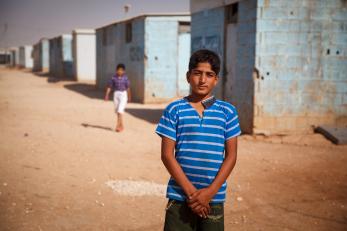
Hasan, 13, is one of Samah’s siblings. He participates in wrestling at one of Mercy Corps’ safe spaces.
“Life is not good because of the dust, the sun, and the water issue in the camp. In the morning I wake up to get the bread from the market, and it’s so hot.
I can’t look at the sun, I have to shield my eyes the whole way there. With the limited water it’s hard — I take one shower a week.”
Ghaleea
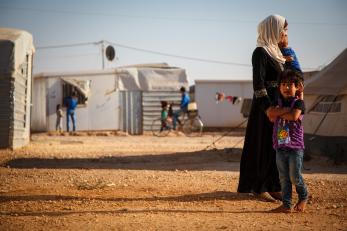
Ghaleea, 30, is from Damascus, Syria. She arrived at Zaatari two years ago with her husband and two children. She coaches soccer and teaches art at one of Mercy Corps’ safe spaces for children.
“We ration our water. It’s so hot and we don’t have cold water to drink. The power goes on and off. Our hands hurt so much from hand washing our clothes.
We got used to the limited water — it comes and goes. I’m worried about how the dust is going to affect the kids.”
Um Abdu
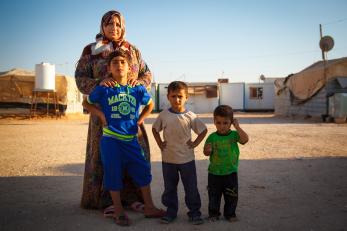
Um Abdu, 25, is from Daraa, Syria. She arrived two and a half years ago, with her husband and three children. Her children play at the nearby Mercy Corps’ playground.
“In general I feel tired from the dust and sun and there is no electricity. The kids go out and play in the sun, which worries me.
In general we know how to manage the limited water. Khalid, 3, got a virus in his eyes from the dust — instead of tears he had blood. We took him to a private doctor outside of the camp and the doctor said it was a consequence of the dust in the camp.”
Reem
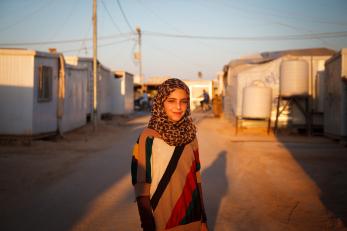
Reem, 14, is from Daraa, Syria and arrived at Zaatari in August 2012. She participates in activities at one of Mercy Corps’ youth spaces.
“The weather is so hot and so dusty, with a lot of dust storms. The weather is not good. It affects everything. People who have asthma can’t live in this situation. It affects our mental health.
It’s not working with this heat and dust and limited water. In Syria it was more comfortable — but here there is not enough water to drink.”
Malak
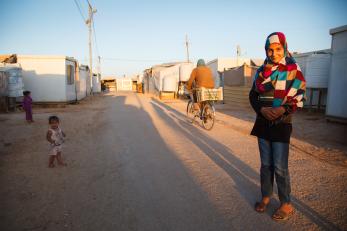
Malak, 12, arrived from Daraa in Aug 2012. Malak uses the Mercy Corps Youth for Change space. She has an unusually positive outlook.
“There’s sun there’s dust. We cope with the sun — we wear hats, sit in the shade. If something happens to us because of the sun, we know to go to the hospital.
The dust and the heat is not good for people. The dust is bad for our eyes and the heat affects our bodies. Right now we don’t have water. Without water we can’t take a shower.”
Showkat
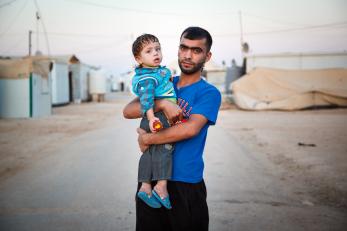
Showkat, 20, is also from Daraa and has been at the camp for three years. He is pictured with his son Omer, who is 18 months old.
“In the summer there’s heat, dust, and no electricity — it makes you feel desperate. The lack of water, the dust, the heat — it makes us more tough. We become angry and have this internal psychological pressure.”
